GDR writer Walter BAUMERT: drafts of a novel about WEERTH
Description
– Wmore See pictures below! –
They bid on extensive materials (usually handwritten by hand, rarely typewritten) of GDR writer Walter Baumert (1929-2016).
About his novel, which was published by a children's book publisher in 1975 "And WEN are not tormented by the devil...: The youth of the poet Georg Weerth."
George Weerth (*17. February 1822 in Detmold; † 30. July 1856 in Havana, Cuba) was a German writer, satirist, journalist and businessman.
Folder (2.5 cm thick) with loose sheets (partly held together with paper clips).
The novel is still here under the Working title “My heart beats for you. George Weerth. The adventures of his life"; On the cover of the folder there is another title: "Hacienda by the sea. Georg Weerth" (perhaps there were originally two different works in the portfolio?).
Initially a smaller folder with drafts for a (apparently unrealized) film adaptation of the novel: "The Fool's Poet's Journey to Hell. Memories of the poet Georg Weerth on the adventures of his youth. TV film in 2 parts by Walter Baumert and Georg Leopold based on motifs from the novel 'And WEN the devil does not torment...' by Walter Baumert."
The drafts are probably not complete, meaning not all passages of the finished novel are covered; Sometimes passages are duplicated. Since the pages are not numbered, the order is not always easy to see; Most of the time they are in the correct order.
Enclosed is a small letter from 1971 to Walter Baumert about his artistic work.
Condition: Pages often browned and stained; partly with edge damage. bplease note also the pictures at the end of the item description!
At the same time, I am offering original poems and other drafts of novels by Walter Baumert!
Internal note: Baumert
Pictures

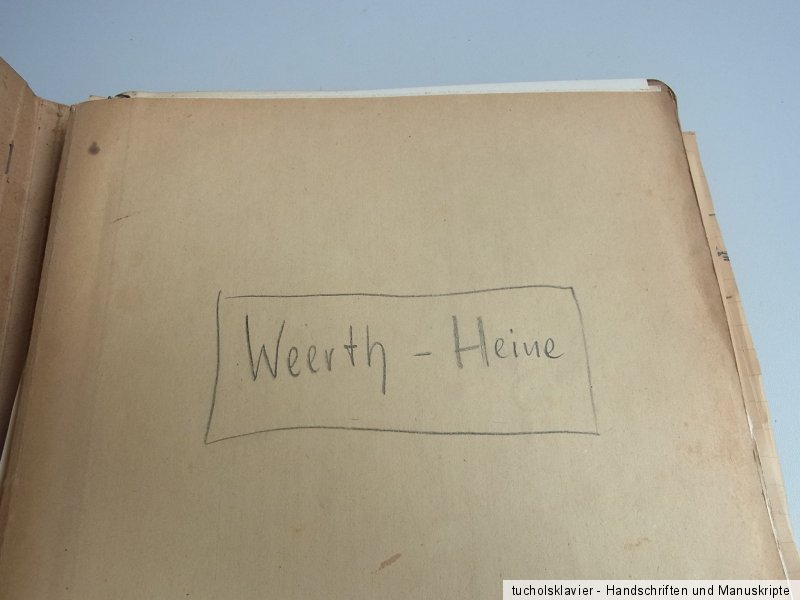


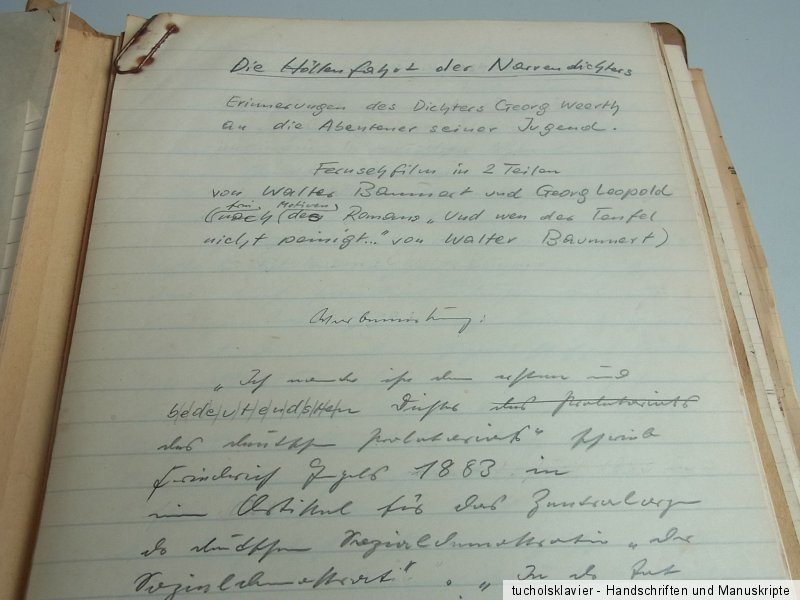
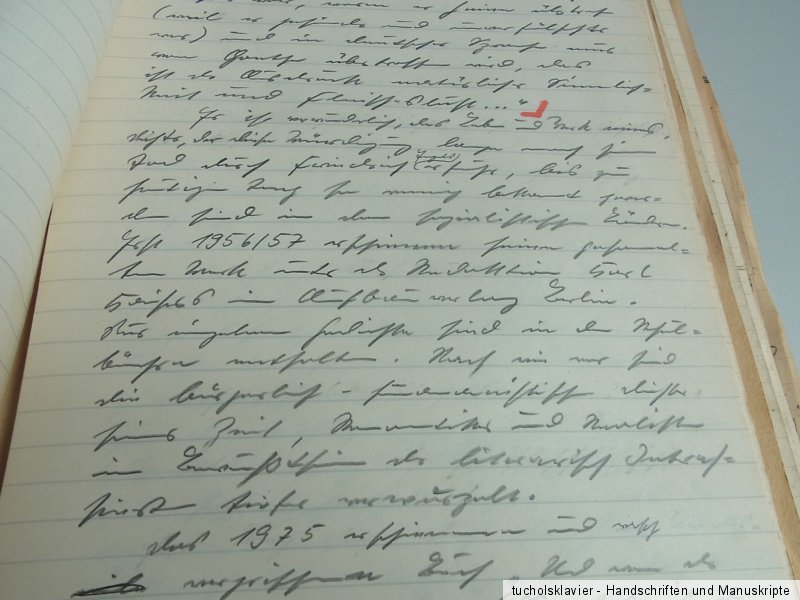
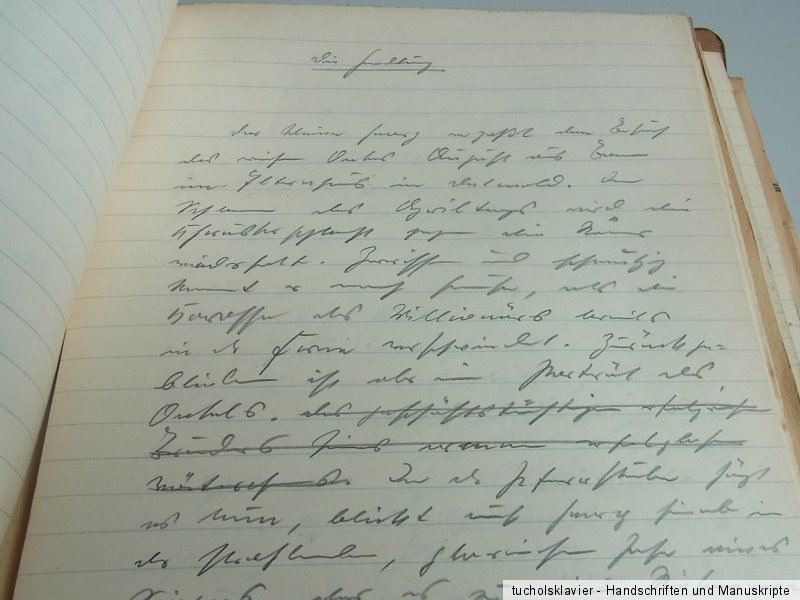

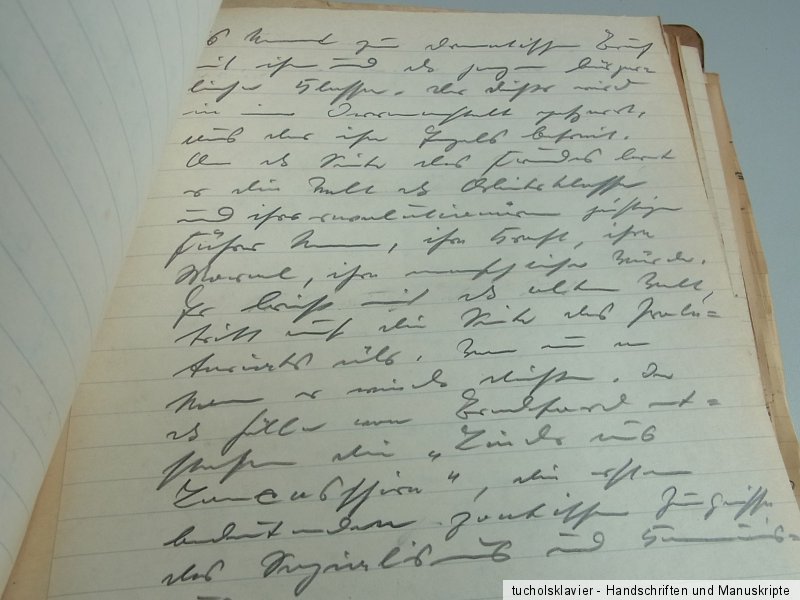
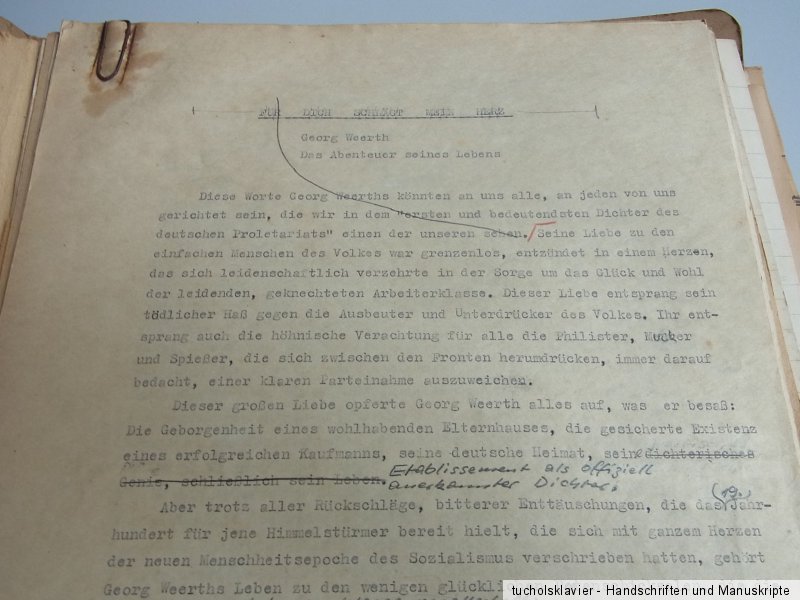


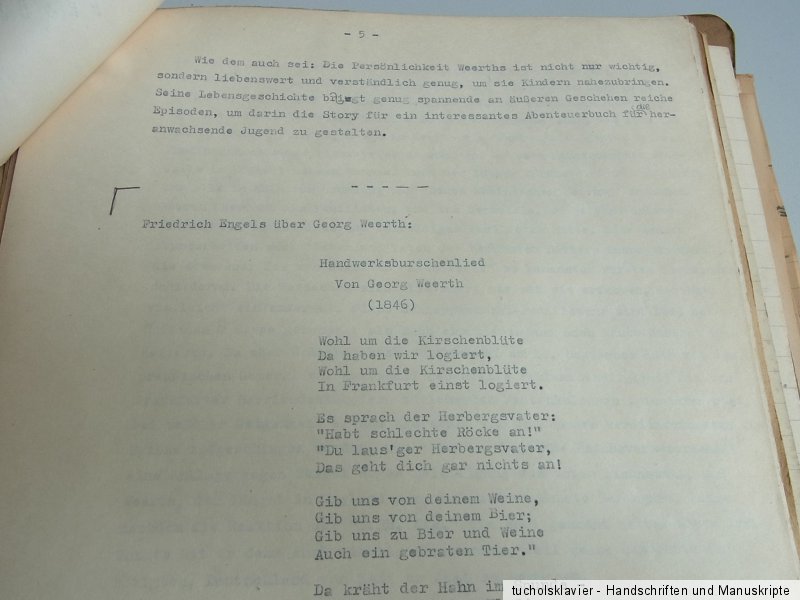
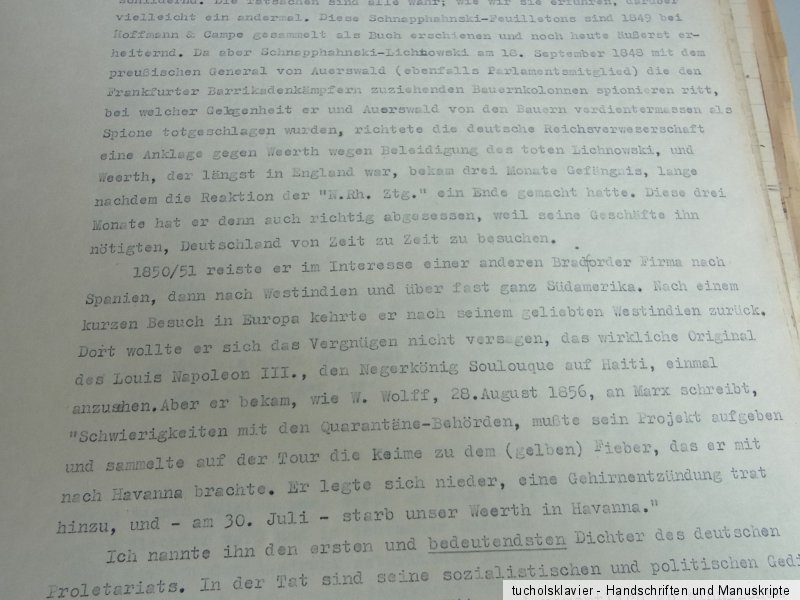


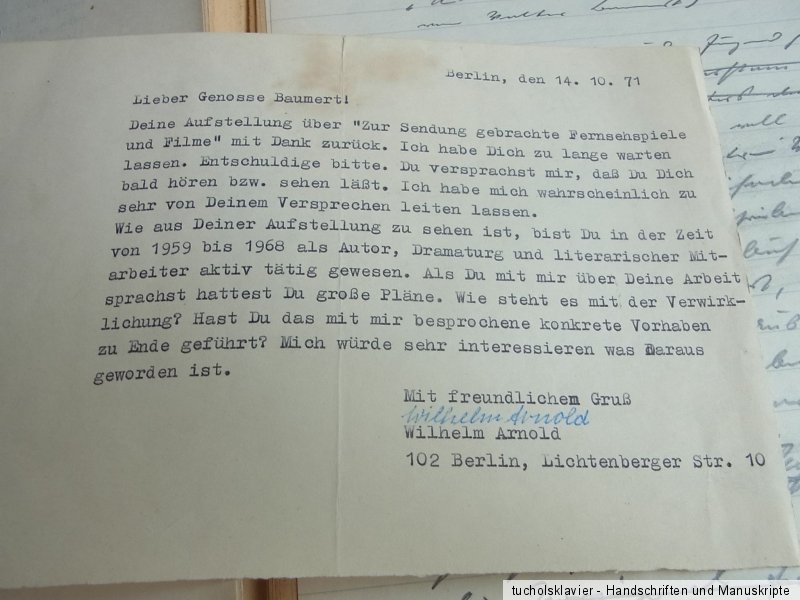

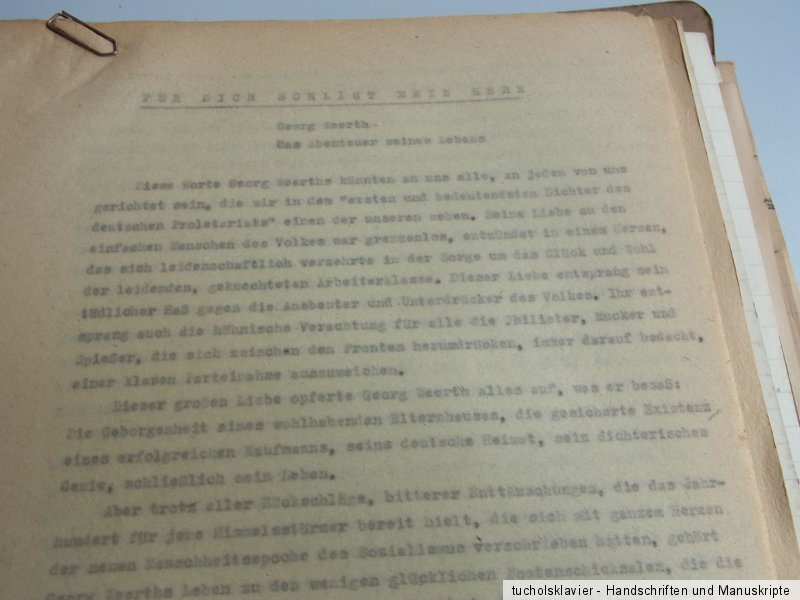



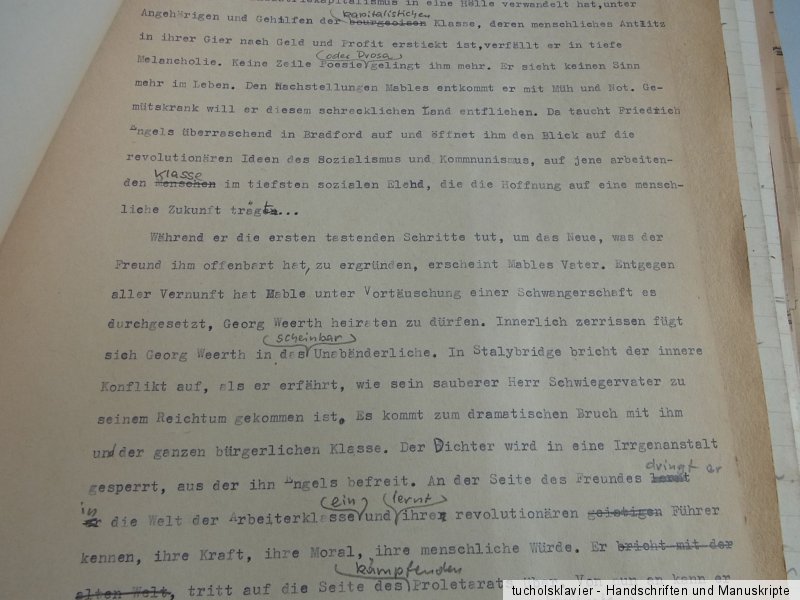
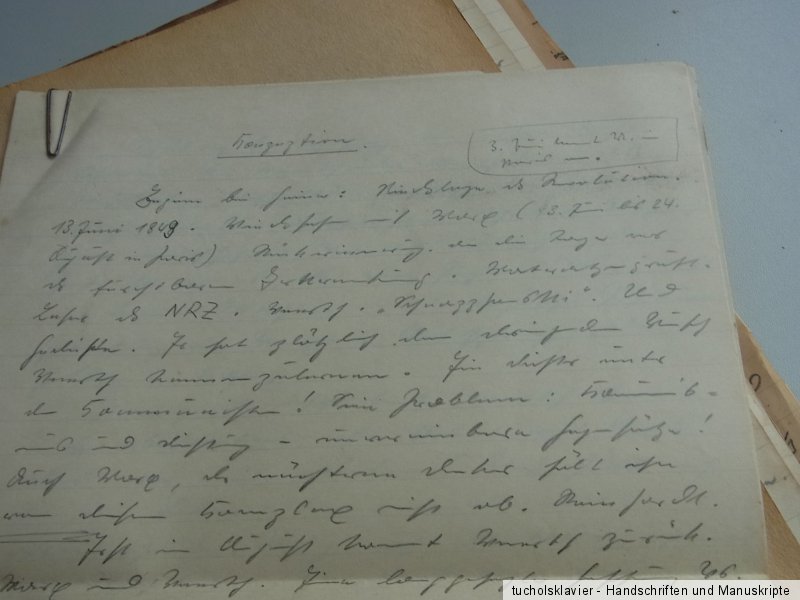
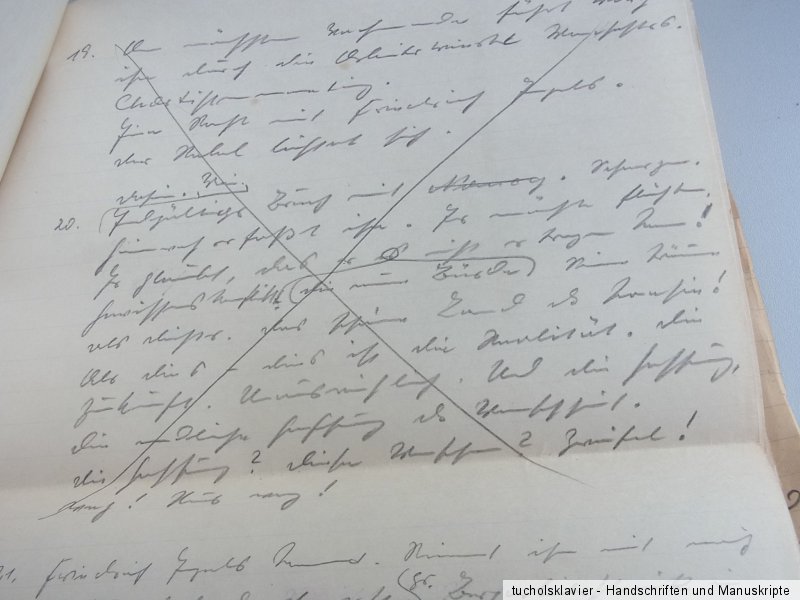

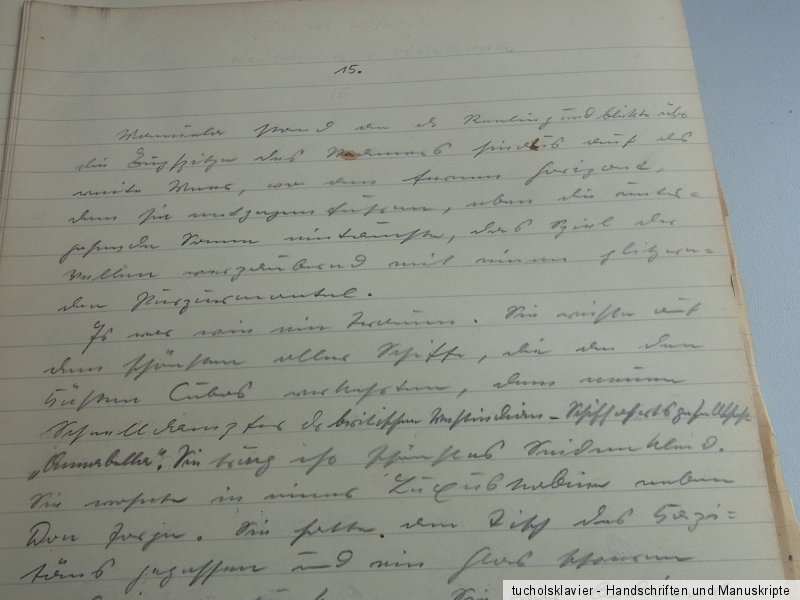
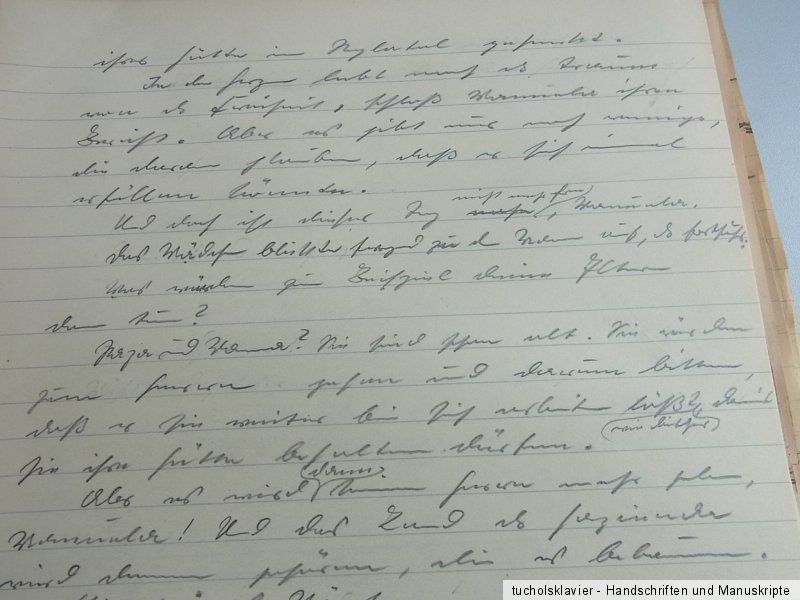








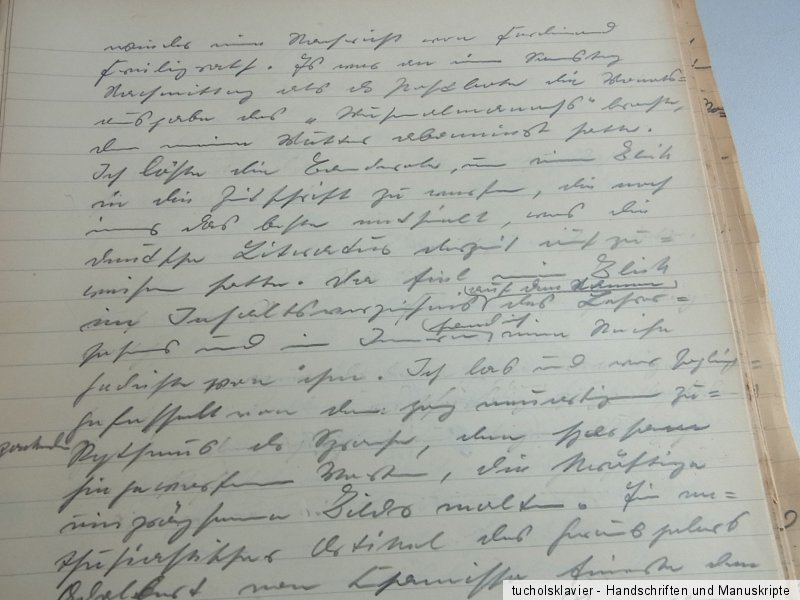

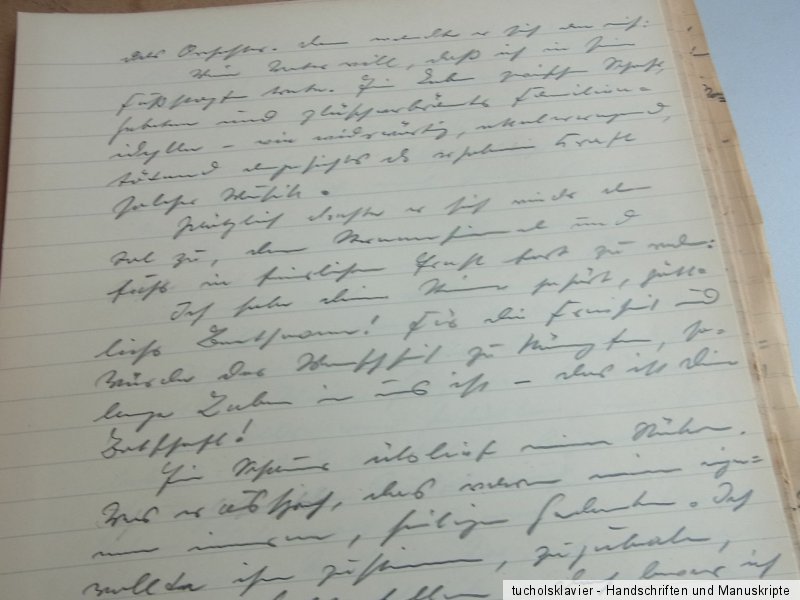



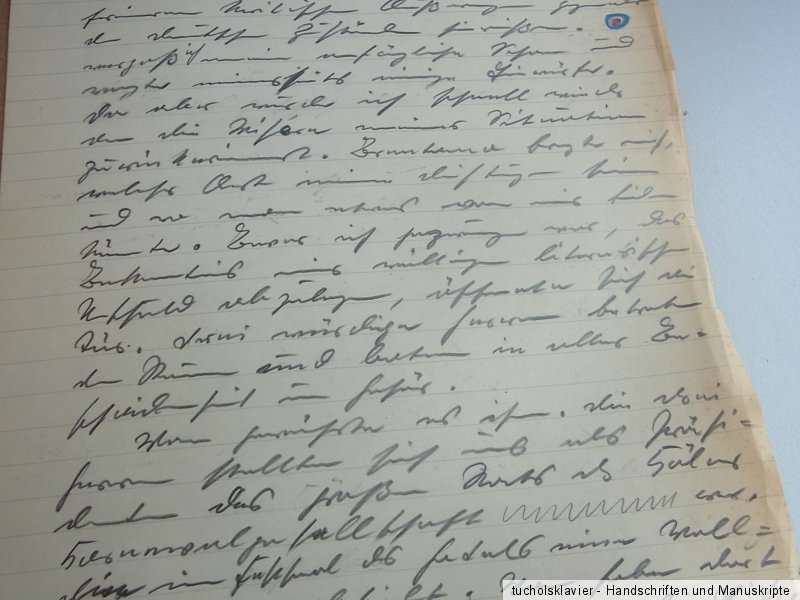

TRIXUM: Mobile-optimized auction templates and image hosting
About Walter Baumert and Georg Weerth (source: wikipedia):
Walter Baumert (*19. February 1929 in Erfurt; † 22. September 2016 in Berlin) was a German writer. He primarily wrote scripts for GDR television films.
Life: Walter Baumert came from a Prussian civil servant family. As a 16-year-old high school student, he volunteered for the Volkssturm, lost his father and parents' home in Posen, was taken prisoner by the Americans and finally found his mother in a village in Eichsfeld. After the revelations at the Nuremberg Trials, he lost his youthful ideals and broke with his bourgeois world.
He learned to be a bricklayer in preparation for studying architecture, but studied philosophy from 1952 to 1958 and then worked for GDR television. He wrote the scripts and television play scenarios for 23 films, some of them in multiple parts. The continuation of his socially critical cycle “Café on Main Street” was banned in 1976. The planned 12-part series about Friedrich Engels' youth was also on hold for 10 years until it was reduced to four parts and broadcast in the GDR in 1985 and taken over by the Federal Republic of Germany in 1989. Production of the two-part television play “The Challenge” was stopped twice until the film was allowed to be broadcast in a heavily shortened and defused form in 1986. The production of the two-part historical television film “The First Year of Liberation” was completely banned. Two of Baumert's books were published at the same time in the GDR and the Federal Republic.
At 16. In June 1961, Walter Baumert received the FDGB literary prize from Herbert Warnke in Magdeburg (left in the picture)
Literature and art prizes
Literature Prize of the Free German Trade Union Federation 1959, 1961
Erich Weinert Medal 1960
Children's and Young People's Book Prize from the GDR Minister for Culture in 1962
Art Prize of the Free German Trade Union Federation 1982 (collectively), 1983, 1987 (collectively)
Main prize of INTERVISION Plovdiv 1981 (collective).
factories
And WEN the devil does not torment... Children's book publisher Berlin, 1975
Look at the earth. Verlag Neues Leben, Berlin 1981. The Flight of the Falcon. Weltkreis-Verlag, Dortmund 1981 (two identical editions under different titles)
The investigation. Verlag Neues Leben, Berlin 1985. Weltkreis-Verlag, Dortmund 1985
Poems from five decades 1945 - 1995. EDITION digital, Pinnow 2012
Filmography
1959: The green folder
1960: Love at the last sight (according to with Winfried Nonnewitz)
1960: The Avalanche
1961: Honeymoon without husband (acc. with Hans-Georg Kalb)
1961: The unknown quantity
1961: If you stick with me
1962: The night on the highway
1962: The new slogan (according to with Werner Dworski)
1963: The silver wedding anniversary
1965: Episodes of Happiness, 2 parts
1966: Shadow over Notre-Dame (according to with Herbert Schauer and Otto Bonhoff), 4 parts
1967: For each other, 1. Part: The Designer 2. Part: The factory manager
1968: Secret ode B 13, (according to. with Armin Müller based on the novel by Eduard Fiker), 4 parts
1968: The Black Rider (acc. with Armin Müller), 3 parts
1969: The Lawyer (acc. with Otto Bonhoff)
1969: Longing for Sabine, from the cycle “Café on Main Street”
1970: Dust and Roses, from the cycle “Café on Main Street”
1976: A chance for Manuela, from the cycle “Café on the Main Street”
1976: Farewell to Gabriela, from the cycle “Café on Main Street”
1981: The investigation
1985: Flight of the Falcon, based on the novel "Look at the Earth", 4 parts
1986: The Challenge
Georg Ludwig Weerth (*17. February 1822 in Detmold; † 30. July 1856 in Havana, Cuba) was a German writer, satirist, journalist and businessman.
Life: Weerth was born on December 17th as the son of the pastor and general superintendent Ferdinand Weerth and the pastor's daughter Wilhelmina Weerth (née Burgmann). Born in Detmold in February 1822. In 1836 the father suffered several strokes and was therefore no longer able to practice his profession. Weerth therefore left the high school in Detmold and started on the 16th. September 1838 in Elberfeld (today in Wuppertal) at the twist, silk and wool yarn store JH Brink & Co., a commercial apprenticeship. In his free time he learned French and English for foreign-language commercial correspondence.
During his apprenticeship, Weerth met Hermann Püttmann (1811–1874), an editor of the liberal Barmer Zeitung, who also worked as a poet and art writer and who introduced Weerth to literature, but also sensitized him to the topic of social issues. In 1838 Weerth became friends with Ferdinand Freiligrath, whose “literary circle” he joined in the same year. This circle consisted of 15 people who met regularly in Barmen to discuss literature and recite poems to each other, some of their own and some of others.
In 1840 Weerth moved to Cologne to work in the administration of the Graf Meinertzhagen lead ore mines, but just two years later, in 1842, he went to Bonn to work in the Weerth & Peill cotton spinning and weaving mill. The company belonged to a close relative, Friedrich from Weerth. In addition to work, Weerth attended lectures at the University of Bonn. He met the theologian Gottfried Kinkel and the ancient Germanist Karl Simrock, who organized liberal poetry circles. The two scientists encouraged Weerth to become literary. They met together in the Maikäferbund, a poet's circle. Weerth's first poem, The Stone Squire, appeared in a collection of poems in 1841.
In 1843 Weerth moved to Bradford in Yorkshire (northern England) to work for two and a half years as a correspondent for the worsted and wool company Ph. Passavant & Co to work. His time there had a lasting impact on him and politicized him. Through his doctor friend John L. MacMichan, who practiced in the working-class areas, he learned about the consequences of industrialization, i.e. the poverty and hardship of the workers in the textile factories.
During his time in England, Weerth made the acquaintance of Friedrich Engels and met Karl Marx on a trip to Belgium in the summer of 1845. He joined the communist movement, whose worldview is reflected in his poems. The traveling salesman Weerth also worked as a courier for the Communist Correspondence Committee founded by Marx and Engels in 1846 and for the League of Communists. “Weerth, the first and most important poet of the German proletariat,” Engels later wrote.
In March 1846, Weerth was offered a job at the Emanuel & Son worsted spinning mill in Brussels, which he accepted immediately. At the same time he published a number of articles in the Deutsche Brusselser Zeitung. When he heard of the outbreak of the revolution in France in February/March 1848, he traveled to Paris to witness and take part in it.
In April 1848 he went to Cologne with Engels and Marx to help found the Neue Rheinische Zeitung. At the newspaper run by Marx, Weerth worked as an editor for Great Britain[2] and Belgium[3] and headed the features section. Here in 1848–1849 he published serials of his satire on the nobility, the life and deeds of the famous knight Schnapphahnski; Weerth used Prince Felix Lichnowsky as a model for the title character. The name “Schnapphahnski” was a nod to Heine, in whose epic Atta Troll this knight appears briefly twice. When Lichnowsky on the 19th When he was murdered in September 1848 - the first chapter was published at the beginning of August - the Weerth brought proceedings for “defamation of the deceased”. In January 1850 he was found guilty and sentenced to three months in prison and the loss of his civil rights for five years. On the 25th. Weerth began his prison sentence in Cologne in February 1850.
After serving his sentence and disappointed by the failure of the revolution, Weerth published no more literary material. He undertook long trading trips through half of Europe (including Spain, Portugal, Great Britain, France). After his company went bankrupt, Weerth took over on January 7th. December 1852 the Steinthal & Co. agency for the West Indies. He moved to the Caribbean island of Saint Thomas and stayed there until June 1855. During this time he traveled to the USA, Mexico, Cuba and Brazil for his company.
On the 15th He returned to Southampton in June 1855; among other things, to propose to his second cousin, Betty Tendering. When she refused, Weerth returned on the 2nd. December 1855 returned to St. Thomas. In March 1856 he decided to move to Havana, Cuba, and retire there. On the 23rd In July 1856, on a business trip to Santo Domingo (Dominican Republic), he fell ill with a fever in Haiti. Although he received immediate medical attention, the attending physician did not make the diagnosis until the 26th. July meningitis. Since it was already advanced and due to cerebral malaria, he could no longer be cured.
On the 30th Georg Weerth died in Havana in July 1856 at the age of 34. In the Cayo Hueso district (Calle Aramburu) there has been a memorial plaque commemorating Weerth on a wall since 1974, the only remaining remnant of what was then the Espada main cemetery.[4][5] His literary and personal legacy is divided into three archives. The most important work manuscripts are located in the International Institute for Social Gescheidis in Amsterdam. In 1936 they were sold there in two boxes for 5,000 marks. Some of the original manuscripts are in the Marx-Engels Institute in Moscow. These were purchased by a private citizen with a literary and political interest in the 1920s. In the Lippische Landesbibliothek Detmold, in addition to autographs of poems and Weerth's personal copy of the Neue Rheinische Zeitung, several hundred original letters from the city's great son were purchased and made available to the public.[6]
factories
Selection
The hunger song. 1844.
The poor from the Senne. In: Hermann Püttmann (ed.): German Citizens' Book for 1845.[7] pp. 266–271.
The industry. In: Hermann Püttmann (ed.): German Citizens' Book for 1845. pp. 346–347.
Craft boy song. (1846) The Social Democrat No. 24 of 7. June 1883. based on Marx-Engels-Werke Volume 21, pp. 5–8.
Craft boy songs. In: Hermann Püttmann (ed.): Album. Original poetry. Reiche, Borna 1847, p. 6 ff. Digital copy
The Liberté du commerce considérée du point de vue prolétaire by MG Weerth and Les protectionnistes, les libres échangistes et la classe ouvrière by M. Karl Marx. CG Vogler, Brussels 1847.
Life and deeds of the famous knight Schnapphahnski. Hoffmann and Campe Hamburg, 1848 ÖNB digital copy, digital copy and full text in the German Text Archive
Illustrated edition August Stritt, Frankfurt am Main 1848 Digital collections of the Lippische Landesbibliothek Detmold